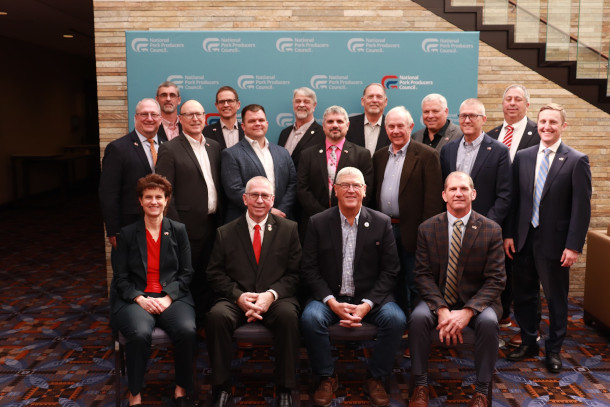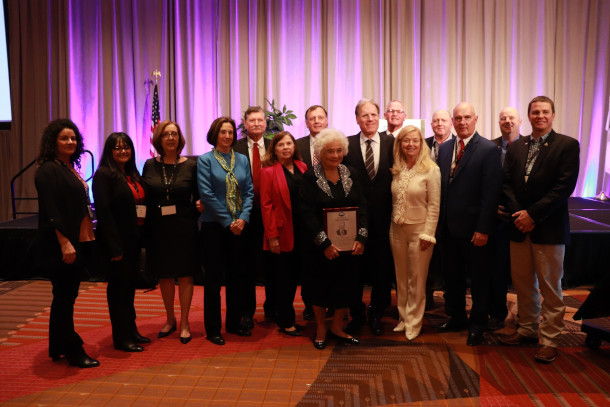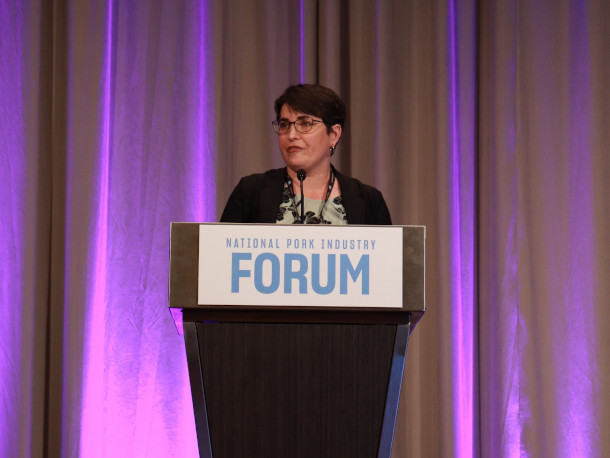Capital Update – For the Week Ending March 8, 2024
In this week’s National Pork Producers Council (NPPC) Friday recap: Producers approve traceability resolution at annual meeting; SEC climate rule victory a relief for agriculture producers; USDA issues final Packers & Stockyards Act rule; NPPC’s Formica says EPA’s WOTUS rule still problematic for farmers; NPPC installs new officers, elects board; and pork industry leaders recognized at Pork Industry Forum. Take a deeper dive below.
Producers approve traceability resolution at annual meeting | SEC climate rule victory a relief for agriculture producers | USDA issues final Packers & Stockyards Act rule | NPPC’s Formica says EPA’s WOTUS rule still problematic for farmers | NPPC installs new officers, elects board | Industry leaders recognized at Pork Industry Forum
Pork Producers Approve Traceability Resolution at Annual Meeting
What happened: Delegates at NPPC’s 2024 annual business meeting — the National Pork Industry Forum — in Chicago approved a resolution to enhance the pork industry’s live swine traceability system.
In 2022, a producer-led task force brought together stakeholders throughout the pork supply chain to identify and address current gaps in the system. The task force offered a series of comment periods for producers to provide input on enhanced standards.
The approved standards will be submitted to the U.S. Department of Agriculture for inclusion in the regulations mandating pre-harvest swine traceability. To view the enhanced standards or learn more, click here.
Why it matters: International meat markets would close immediately if a foreign animal disease, such as African swine fever, was detected in the United States. Strengthening live swine traceability will better assure animal health officials have quick access to comprehensive movement data, show trading partners that the United States knows where disease-free animals are, and support resumption of U.S. pork exports, which last year were more than $8.2 billion.
SEC Climate Rule Victory a Relief for Agriculture Producers
What happened: In a huge win for agricultural producers, the U.S. Securities and Exchange Commission (SEC) dropped a controversial provision from its final greenhouse gas (GHG) reporting rule that would have mandated publicly traded companies to gather GHG data from their customers, suppliers, and distributors. Publicly traded companies will still need to report climate-related information to the SEC but will be allowed to determine whether their investors need the information to make decisions.
NPPC’s take: NPPC helped lead agriculture’s fight against the SEC’s application of “burdensome and unnecessary” climate disclosure requirements under Scope 3 of the proposed rule. That provision could have required a large meatpacking company, for example, to report, among other things, climate-related information from every farm supplying it with livestock, adding burdensome paperwork for producers.
In comments submitted in June 2022, NPPC and other agricultural organizations asked the SEC to remove or substantially revise the Scope 3 emissions disclosure requirement and ensure any final rule aligned with GHG emissions disclosures required under existing federal emissions reporting programs and federal law protecting livestock farmers from costly, inaccurate, and unduly burdensome GHG emissions reporting.
Why it’s important: Had the SEC rule been adopted as initially proposed in March 2022, it would have driven further consolidation in the agriculture industry as larger publicly traded companies sought complete control of their entire supply chains to avoid the risk of shareholder and activist litigation. It would also have forced independent producers out of business, exposed all producers to lawsuits, and created new avenues for activist groups to attack the agriculture industry, according to NPPC.
USDA Issues Final Packers & Stockyards Act Rule
What happened: The U.S. Department of Agriculture’s Agricultural Marketing Service (AMS) this week issued a final rule amending Packers and Stockyards Act (PSA) regulations to prohibit “undue prejudice” and “unjust discrimination” by regulated entities, including packers and swine contractors, against individuals based on specific characteristics. It also identifies prohibited retaliatory and deceptive practices and increases recordkeeping requirements to comply with the rule. The final rule is set to take effect May 6, 2024.
The regulation, known as the “Inclusive Competition and Market Integrity under the Packers and Stockyards Act,” prohibits actions that would inhibit market access or are “materially adverse” against producers on the basis of race, color, national origin, sex, disability, marital status, age, or because of a producer’s status as a cooperative. That list replaces AMS’s original proposal of protecting a broad and undefined group of “market vulnerable individuals.”
The rule prohibits regulated entities from retaliating or taking adverse action against covered producers for communicating with government officials or businesses and choosing to form or join an association. It also prohibits the use of “false or misleading statements or omissions of material information” during contract formation, performance, termination, as well as in situations where regulated entities refuse to form a contract.
While the PSA already prohibits unjust discrimination and undue prejudices or preferences that have an anticompetitive effect, the new rule implies that for actions prohibited under the rule, AMS does not believe proof of anticompetitive harm is necessary to establish a violation of the PSA.
NPPC’s take: In comments submitted to AMS in January 2023, NPPC said the Inclusive Competition and Market Integrity rule “does not appear to address any specific existing issue” and “the definitions and regulations … are vague and overbroad, creating unnecessary uncertainty that would make it difficult for regulated entities to demonstrate compliance and result in burdensome and costly litigation.”
NPPC also noted that the primary components of the rule already are prohibited under existing laws, including the PSA, and pointed out that many of the new rule’s provisions “fall outside the scope of the PSA.”
Most significantly, AMS removed the broad “market vulnerable individual” language and adopted a specific list of prohibited bases for discrimination based in part on NPPC’s comments.
Why it matters: Pork producers rely on enforcement of the PSA, which was enacted to protect competition in the meat and poultry industries, ensuring fair markets and competitive pricing opportunities. Because regulated entities include packers and swine contractors, independent producers utilizing production contracts may also be subject to increased risk of litigation under the new regulations.
NPPC’s Formica: EPA’s WOTUS Rule Still Problematic for Farmers
What happened: In a recent public hearing addressing the implementation of the Waters of the United States (WOTUS) rule by the Army Corps of Engineers and the U.S. Environmental Protection Agency (EPA), NPPC chief legal strategist Michael Formica expressed ongoing concerns about the rule’s implications for producers.
During the Obama and Biden administrations, these agencies sought to expand its authority to include waters with even a tenuous connection to covered waters, such as drains, ditches, stock ponds, and low spots on farmlands. This expansion could have required CWA permits for routine agricultural activities near those features, subjecting producers to civil and criminal penalties.
But the U.S. Supreme Court in May 2023 limited their authority, holding that CWA waters “refers only to geographical features that are described in ordinary parlance as streams, oceans, rivers and lakes and to adjacent wetlands that are indistinguishable from those bodies of water due to a continuous surface connection.”
NPPC’s take: In his remarks, Formica pointed out that EPA’s rule and its implementation, purportedly conforming with the high court’s 2023 decision, continues to lack clarity and consistency.
In particular, while farmers struggle to understand what it requires, Formica noted that it isn’t practical for farmers to seek guidance from EPA on whether an activity is legal every time they need to move dirt, plow a field, or erect a fence. Additionally, Formica raised serious concerns over EPA’s use of “internal” guidance, which has not been shared with the public, to implement and enforce its new WOTUS rule, a prospect he called “outrageous” for an already confusing law.
Formica said he continues to hear reports from farmers in multiple states that, despite the Supreme Court ruling, EPA is asserting jurisdiction over ephemeral streams that are far removed from navigable waters, including streams that weren’t even covered under the earlier expansive WOTUS rule.
NPPC Installs New Officers, Elects Board of Directors
What happened: NPPC installed new officers and elected members to its board of directors at the National Pork Industry Forum.
The 2024-2025 NPPC board officers are:
- President – Lori Stevermer, Easton, Minnesota.
- President-Elect – Duane Stateler, McComb, Ohio
- Vice President – Rob Brenneman, Washington, Iowa
- Immediate Past President – Scott Hays, Monroe City, Missouri.
The 2024-2025 board of directors are:
- Craig Edsill, Hatfield, Pennsylvania, Packer Processor Industry Council representative.
- Francis Forst, Lamar, Missouri.
- Pat Hord, Bucyrus, Ohio.
- Bob Ivey, Goldsboro, North Carolina.
- Steve Malakowsky, Mankato, Minnesota, Alliance representative
- Todd Marotz, Sleepy Eye, Minnesota.
- Dwight Mogler, Lester, Iowa.
- Jeremy Pittman, Waverly, Virginia.
- Edward Reed, Three Rivers, Michigan.
- Jeb Stevens, Osgood, Indiana.
- Russ Vering, Howells, Nebraska.
- Neill Westerbeek, Clinton, North Carolina.
Elected to NPPC’s nominating committee for a two-year term were:
- William Knapke, Fort Recovery, Ohio.
- Jason Propst, Toledo, Illinois.
Why it matters: The NPPC board of directors is a critical part of NPPC’s success, collaborating closely with the existing leadership team to steer NPPC toward achieving its strategic goals and enhancing membership value.

2024-2025 NPPC board of directors and CEO Bryan Humphreys (far right).
Pork Industry Leaders Recognized, Scholarship Winners Announced at Pork Industry Forum
What happened: Prestigious honors were bestowed at the 2024 National Pork Industry Forum.
Bill Prestage, co-founder and president of Prestage Farms and Prestage Foods, was inducted into the NPPC Hall of Fame during the 2024 National Pork Industry Forum. The award recognizes individuals who devoted their lives to advancing the pork industry.
Prestage, who passed away in October 2022, revolutionized pork production with an emphasis on quality, sustainability, and animal welfare. Under his guidance, Prestage Farms became a leader in pork production and a model for corporate responsibility and community engagement.
Anne Miller, who served as executive director of the Montana Pork Producers Council from 2004-2022, was honored with the Paulson-Whitmore State Executive Award during the National Pork Industry Forum. This award recognizes exceptional leadership and unwavering commitment by state executives within the pork industry.
Hailing from Jordan, Montana, Miller’s impact extended beyond state borders when she also became the state executive for the Wyoming Pork Producers Council in 2009. Her leadership encompassed disaster relief, emergency services, and innovative biosecurity enhancements for health facilities. Miller’s strategic efforts made her a deserving recipient of the award.
Emphasizing the continued need to invest in the next generation of pork industry leaders, NPPC also announced recipients of the Lois Britt Memorial Pork Industry Scholarship and the Neil Dierks Scholarship. Scholarship applications for 2025 will open in September 2024. To learn more about the application process, click here.

Marsha Prestage (center) accepts late husband Bill Prestage’s plaque for the NPPC Hall of Fame.
Anne Miller accepts the Paulson-Whitmore State Executive Award.
